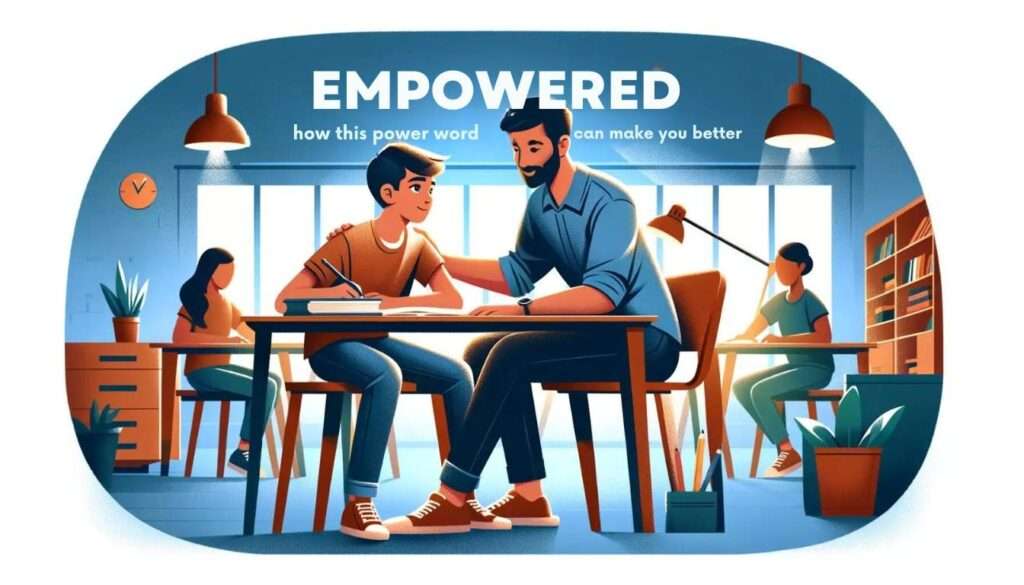Introduction
“Empowered: How this power word can make you better” emphasizes that empowerment is about taking control of your life and making choices that align with your values and goals.
Have you ever felt stuck, unsure of yourself and your abilities? Perhaps you’ve been in a situation where you didn’t feel like you had any control over what was happening to you or that your voice mattered. These are common experiences that many people have faced at some point in their lives. That’s where the concept of empowerment comes in.
It’s about recognizing your strengths and abilities and using them to create positive change in yourself and the world around you. When we feel empowered, we are more likely to take risks, try new things, and pursue our dreams with confidence.
An explanation of what empowerment means and its significance in personal growth
Empowerment is a multifaceted concept that can be difficult to define. At its core, however, empowerment involves gaining control over one’s life circumstances by building awareness of oneself as an independent agent who can exercise power over their choices. The significance of empowerment for personal growth cannot be overstated.
When we feel disempowered or helpless, it can lead to feelings of depression, anxiety, or even hopelessness. On the other hand, when we experience a sense of agency over our lives through our actions towards achieving specific goals or through expressing ourselves creatively as individuals through art forms such as writing poetry and prose, among others, this gives us motivation & incentive towards self-improvement, which helps promote healthy personal development.

Brief Overview Of How The Power Word “Empowered” Can Positively Impact One’s Life
The word ’empowered’ holds great potential for a positive impact on an individual’s life because it carries meaningful connotations related to self-awareness and self-confidence. Feeling empowered can help us overcome adversity by giving us the strength to take risks and pursue our goals. It allows us to develop a more positive outlook on life because we believe in our ability to shape the future.
Empowerment also fosters a sense of community and connection as we seek out opportunities to empower others and work towards shared goals. The powerful word “empowered” is an essential tool for personal growth that can help individuals overcome obstacles, foster community connections, and achieve their goals with greater confidence.
Understanding Empowerment
Empowerment is a buzzword that has been thrown around quite a bit lately, but what exactly does it mean? At its core, empowerment is the act of giving oneself or others the power or authority to take control of their lives.
It’s about feeling capable and confident in one’s ability to make decisions and achieve goals. Empowerment can take many forms.
Self-empowerment, for example, is all about building self-confidence and taking control of one’s life. This can be achieved through various means, such as setting goals, learning new skills, or simply practicing self-care.
Community empowerment involves working together with others to create positive change in society. This could include anything from volunteering at a local shelter to organizing a grassroots campaign for social justice.
It’s important to note that empowerment is not about entitlement or control. Entitlement implies that one should automatically have power without putting in any effort, while control implies having power over others rather than empowering them.
Empowerment is about giving oneself or others the tools they need to thrive, rather than simply taking power away from someone else. One of the biggest benefits of feeling empowered is increased confidence and motivation to achieve one’s goals.
When we feel capable and in control of our lives, we’re more likely to pursue our passions and take risks without fear of failure. Additionally, feeling empowered allows us to better navigate challenging situations by focusing on solutions rather than dwelling on problems.
How to Empower Yourself
Identifying your strengths and weaknesses
The first step to empowering yourself is understanding who you are. This means identifying your strengths and weaknesses. Your strengths are the things you excel at, while your weaknesses are areas where you struggle.
When you have a clear understanding of your strengths and weaknesses, creating a plan for self-improvement becomes much easier. Reflecting on what you’re good at and what needs work allows you to set realistic goals and develop a roadmap for personal growth. Take some time to assess your skills, identify areas for improvement, and consider how you can build on your strengths. By focusing on both your positive attributes and areas where you can grow, you can set yourself on a path to achieving your full potential.
Ask others for feedback if needed. Write down your findings so that you can refer back to them when needed.
Setting achievable goals
Once you know what areas of your life need improvement, set achievable goals for yourself. These goals should be specific, measurable, attainable, relevant, and time-bound (SMART).
For example, if one of your weaknesses is public speaking, set a goal to speak in front of a small group before the end of the month. Make sure that the goal is challenging but realistic, and don’t be afraid to adjust it as needed.
Building self-confidence
Self-confidence is crucial when it comes to feeling empowered. To build self-confidence, start by focusing on positive self-talk. Replace negative thoughts with positive affirmations, such as “I am capable” or “I am enough.” Surround yourself with supportive people who encourage and motivate you instead of bringing you down.
Practicing positive affirmations
Positive affirmations can be an effective way to boost confidence and stay motivated when working towards personal goals. These are simple statements that help reframe negative thoughts into more positive ones. Practice saying these affirmations out loud every day or writing them down in a journal.
Finding support systems
Empowering yourself doesn’t mean doing everything alone; finding support systems can be very helpful in achieving personal growth goals. Surround yourself with people who believe in you and are committed to helping you succeed.
Seek mentors, accountability partners, or support groups in areas where you need help or guidance. Remember, asking for help is not a sign of weakness but rather a sign of strength because it shows that you’re willing to learn and grow.

Empowering Others
The Importance of Empowering Others
Empowering others isn’t just about helping them achieve their goals. It’s about giving them the confidence to achieve those goals on their own. When we empower others, we’re essentially saying, “I believe in you and your abilities.” This kind of validation can be incredibly powerful, especially for those who may not have had a lot of support or encouragement in the past.
In addition to boosting someone’s confidence, empowering others can also create a ripple effect. When we feel empowered, we’re more likely to pass that feeling on to others.
By empowering our friends, family members, and colleagues, we’re creating a network of individuals who are all working towards their best selves. It’s this sense of community and shared purpose that can make us all better.
Ways to Empower Others (e.g., active listening, offering constructive feedback)
So how do we go about empowering others? There are many different approaches you can take, but one of the most important is simply to listen actively. When you engage with someone on a deep level and hear what they have to say, it sends the message that they matter and that their thoughts and feelings are valid.
Another way to empower others is by offering constructive feedback. It’s important not just to tell someone what they’re doing wrong but also to offer specific suggestions for improvement.
By focusing on solutions rather than problems, you can help someone feel more confident in their abilities. Other ways you can empower those around you include celebrating their successes (no matter how small), offering words of encouragement when things get tough, and simply being there for them when they need support.
The Benefits of Empowering Others
When we empower others, there are benefits not just for them but for ourselves as well. For one thing, it feels good to help others succeed.
Knowing that you played a role in someone else’s achievements can be incredibly rewarding. Empowering others can also help us improve our skills and abilities.
When we teach someone else how to do something, we’re reinforcing our knowledge and expertise. Additionally, by working with others towards a common goal, we’re learning how to collaborate and communicate effectively—skills that are valuable in many different areas of life.
Ultimately, empowering others is about creating a more positive and supportive world. By lifting each other and helping each other succeed, we’re all better off in the long run.
Empowerment in Action: Real-Life Examples
Empowerment is not just a concept but a practice that can lead to significant changes in one’s life. Here are some real-life examples of individuals who have empowered themselves and others:
The Empowered Entrepreneur
Meet Jane, a young entrepreneur who started her own business at the age of 25. After facing numerous rejections for job applications, Jane decided to take matters into her own hands and start her own business.
She realized that she had the skills, knowledge, and passion for entrepreneurship but lacked the confidence to fully pursue it. Jane decided to attend workshops on entrepreneurship, network with other entrepreneurs, and seek advice from mentors.
She also read books on successful entrepreneurship stories for inspiration and guidance. Through these efforts, Jane developed a sense of empowerment as she gained knowledge and skills for starting her own business.
Today, Jane’s business has become successful, with several employees working under her. She states that empowerment has enabled her to overcome her fears of failure and pursue what she truly loves doing.
The Empowered Educator
Another example of empowerment in action is Sarah, an educator who works with children living in low-income communities. Sarah was determined to make a difference in the lives of these children, who often lacked basic resources such as textbooks or access to technology. Sarah began by researching different teaching methods that could be applied to students living in low-income areas.
She then designed lesson plans that incorporated fun activities while still addressing academic objectives. Additionally, Sarah collaborated with parents and community members to create additional learning opportunities outside the classroom.
After implementing these strategies over time, Sarah saw an improvement in student performance levels along with increased student engagement both inside and outside the classroom. To sum it up: empowerment is not just an abstract concept but a way of life that can lead individuals towards success if motivated enough through different means such as education, entrepreneurship, and activism.

Overcoming Obstacles to Empowerment
Fear: The Ultimate Barrier to Empowerment
Fear can be one of the most significant obstacles to feeling empowered. Fear of failure, rejection, or the unknown can all hold us back from taking important steps toward self-empowerment. However, it’s essential to recognize that fear is a natural part of the human experience and that it often arises when we’re trying something new or challenging ourselves.
The key is not to let fear dictate our actions and prevent us from achieving our goals. One strategy for overcoming fear is to break down the source of your anxiety into smaller, more manageable parts.
For example, if you’re afraid of public speaking, start by speaking in front of a small group of friends or colleagues before moving on to larger audiences. Another useful technique is visualization; imagine yourself successfully overcoming your fears and focusing on those positive outcomes rather than the negative possibilities.
Self-Doubt: Silencing Your Inner Critic
Another common obstacle to empowerment is self-doubt—that inner voice that tells you you’re not good enough or capable enough to succeed. While it’s normal for everyone to have moments of self-doubt now and then, allowing those negative thoughts to take over can become a significant barrier to feeling empowered. To overcome self-doubt, try reframing your thinking by focusing on your strengths rather than your weaknesses.
Create a list of accomplishments and skills that make you proud, and remind yourself regularly about these positive qualities. Surrounding yourself with supportive people who believe in your abilities can also help boost confidence levels and silence negative thoughts.
Remember that feeling empowered isn’t about being perfect – it’s about taking steps towards personal growth and development despite any obstacles that may arise along the way. With persistence and perseverance, anyone can overcome common barriers like fear and self-doubt, and enjoy the many benefits that come with feeling empowered.
Conclusion: Embracing Empowerment as a Way of Life
Empowerment is not just a buzzword. It is a powerful tool that can help you achieve your goals and improve your life in numerous ways. By recognizing your strengths, setting achievable goals, building self-confidence, practicing positive affirmations, and finding support systems, you can empower yourself to become the best version of yourself.
Empowering others is also important, as it not only benefits them but also has a positive impact on society as a whole. By offering constructive feedback, actively listening, and showing empathy toward others’ struggles, you can inspire and motivate them to achieve their full potential.
Overcoming obstacles to empowerment is crucial to fully embracing it as a way of life. Fear and self-doubt are two common obstacles that may hold us back from feeling empowered.
However, by developing strategies such as reframing negative thoughts or seeking professional help if necessary, we can overcome these obstacles and embrace empowerment as a part of our everyday lives. By embracing empowerment as a way of life, we can unlock our full potential and achieve our goals, becoming more capable individuals.
Empowerment leads to greater happiness, success, and fulfillment in all areas of life. So let us strive for personal growth through self-empowerment while also inspiring others around us to do the same.
FAQs
What does it mean to be empowered?
Being empowered means taking control of your life, making choices that align with your values, and recognizing your strengths to create positive change for yourself and others.
How can I empower myself?
You can empower yourself by identifying your strengths and weaknesses, setting achievable goals, building self-confidence, practicing positive affirmations, and seeking support from people who believe in you.
How does empowerment impact personal growth?
Empowerment fosters personal growth by providing the motivation and confidence to pursue your dreams, overcome obstacles, and develop a positive outlook on life.
How can I empower others?
You can empower others by actively listening, offering constructive feedback, celebrating their successes, and supporting them through challenges. Empowering others creates a positive and supportive community.
What are the benefits of being empowered?
The benefits of being empowered include increased confidence, motivation, and resilience. It also fosters a sense of community, encourages personal growth, and helps individuals achieve their goals with greater confidence.
How can I overcome obstacles to empowerment?
You can overcome obstacles to empowerment by facing your fears, silencing your inner critic, and seeking help when needed. Reframing negative thoughts and focusing on your strengths can also help.
How does empowerment benefit relationships?
Empowerment benefits relationships by improving communication, fostering mutual support, and creating a positive environment where people feel valued and appreciated.
What role does failure play in empowerment?
Failure plays a crucial role in empowerment by providing learning opportunities and building resilience. Embracing failure as a stepping stone to success fosters growth and development.
How can empowerment improve career prospects?
Empowerment can improve career prospects by boosting confidence, encouraging risk-taking, and enhancing leadership skills. Empowered individuals are often seen as proactive and capable.
How does being empowered contribute to overall well-being?
Being empowered contributes to overall well-being by fostering a positive mindset, enhancing self-confidence, and encouraging a proactive approach to life’s challenges.






